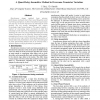191 search results - page 3 / 39 » Clock Distribution Design in VLSI Circuits. An Overview |
111
click to vote
ISPD
2005
ACM
15 years 7 months ago
2005
ACM
In the nanometer VLSI technology, the variation effects like manufacturing variation, power supply noise, temperature etc. become very significant. As one of the most vital nets...
100
click to vote
VLSID
2005
IEEE
16 years 2 months ago
2005
IEEE
Synchronous design methods have intrinsic performance overheads due to their use of the global clock and timing assumptions. In future manufacturing processes not only may it beco...
108
click to vote
ASPDAC
2010
ACM
14 years 12 months ago
2010
ACM
Abstract--In nanometer-scale VLSI physical design, clock network becomes a major concern on determining the total performance of digital circuit. Clock skew and PVT (Process, Volta...
VLSID
2005
IEEE
16 years 2 months ago
2005
IEEE
Timing margin (slack) needs to be carefully managed to ensure a satisfactory timing yield. We propose a new design flow that combines a false-path-aware gate sizing and a statisti...
149
Voted
ISVLSI
2008
IEEE
15 years 8 months ago
2008
IEEE
As integrated circuits are scaled down it becomes difficult to maintain uniformity in process parameters across each individual die. The resulting performance variation requires ...


